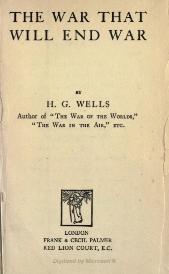The war to end war


"The war to end war" (sometimes called "The war to end all wars")[1] was a term for World War I. Originally idealistic, it is now used mainly sardonically.[2]
Origin
During August 1914, immediately after the outbreak of the war, British author and social commentator H. G. Wells published a number of articles in London newspapers that subsequently appeared as a book entitled The War That Will End War.[3] Wells blamed the Central Powers for the coming of the war and argued that only the defeat of German militarism could bring about an end to war.[4] Wells used the shorter form of the phrase, "the war to end war", in In the Fourth Year (1918), in which he noted that the phrase had "got into circulation" in the second half of 1914.[5] In fact, it had become one of the most common catchphrases of the war.[4]
In later years, the term became associated with Woodrow Wilson, despite the fact that Wilson used the phrase only once.[6] Along with the phrase "make the world safe for democracy", it embodied Wilson's conviction that America's entry into the war was necessary to preserve human freedom.[6]
Later use
Even during World War I, the phrase met with some degree of skepticism; the British politician David Lloyd George is reputed to have said, "This war, like the next war, is a war to end war."[7] As it became apparent that the war had not succeeded in ending war, the phrase took on a more cynical tone. Field Marshal Earl Wavell said despondently of the Paris Peace Conference, "After the 'war to end war', they seem to have been in Paris at making the 'Peace to end Peace'."[8] Wells himself used the phrase in an ironic way in the novel The Bulpington of Blup (1932).[9] Walter Lippmann wrote in Newsweek in 1967, "The delusion is that whatever war we are fighting is the war to end war", while President Richard Nixon, in his "Silent Majority" speech, said, "I do not tell you that the war in Vietnam is the war to end wars".[2]
See also
References
- ^ The war to end all wars BBC News 10 November 1998
- ^ a b Safire, William (2008). Safire's Political Dictionary. Oxford University Press US. pp. 792–3. ISBN 978-0-19-534334-2. Retrieved 2010-08-24.
- ^ Wagar, W. Warren (2004). H.G. Wells: Traversing Time. Wesleyan University Press. p. 147. ISBN 978-0-8195-6725-3. Retrieved 2010-08-24.
- ^ a b Rempel, Richard A., ed. (2003). The Collected Papers of Bertrand Russell. Routledge. p. 10. ISBN 978-0-415-10463-0. Retrieved 2010-08-24.
- ^ Wells, H. G. (2008). Short Works of Herbert George Wells. BiblioBazaar, LLC. pp. 13–14. ISBN 978-1-4375-2652-3. Retrieved 2010-08-24.
- ^ a b Jamieson, Kathleen Hall (1990). Eloquence in an Electronic Age: The Transformation of Political Speechmaking. Oxford University Press US. p. 99. ISBN 978-0-19-506317-2. Retrieved 2010-08-24.
- ^ Stimpson, George William (1952). A Book about American Politics. Harper. p. 365. Retrieved 2010-08-24.
- ^ Pagden, Anthony (2008). Worlds at War: The 2,500-year Struggle between East and West. Oxford University Press US. p. 407. ISBN 978-0-19-923743-2. Retrieved 2010-08-24.
- ^ Wells, H. G. (1932). The Bulpington of Blup. pp. 161, 163, 173. Retrieved 2010-08-24.
External links
H. G. Wells, The War That Will End War on the Internet Archive
